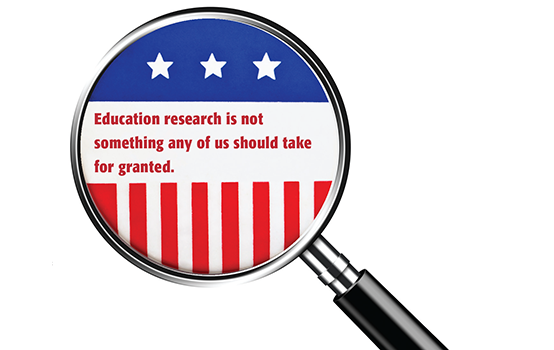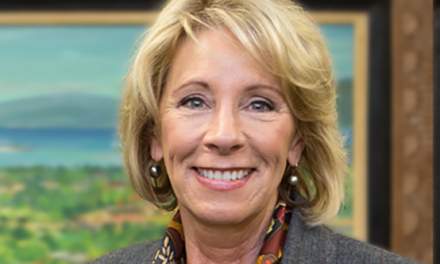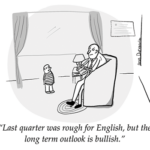Education researchers and policy makers often seem at odds with each other, but that’s an even better reason to expand education research.
Education research is a hot topic in Washington. I’m not talking “House of Cards” or “Scandal” hot, but hot for education types who have been waiting a long time for Congress to take up any piece of education law. While other broad education legislation continues to await reauthorization, Congress has managed to make progress on behalf of education research. The Educational Sciences Research Act (ESRA) may not win a name recognition contest, but it is an important part of the nation’s education agenda nonetheless. The fact that a bipartisan bill to reauthorize ESRA — the Strengthening Education Through Research Act or SETRA — is making its way through Congress is not only a sign of hope that things can get done, it is also an acknowledgement that education research is not something any of us should take for granted.
My organization, the Center on Education Policy (CEP), has both hosted and participated in many conversations about the role research plays in education policy and practice. Focusing tightly on education policy while being housed within a university, we are acutely aware that policy makers view research through a completely different lens than education researchers. Policy makers tend to lead with policy and then look to research to validate their decision making. While this may not seem to be the best way to address education issues, we must be aware that the political nature of education — especially at the federal level — almost demands this kind of leap-before-you-look approach.
Education programs with iconic names like Goals 2000, No Child Left Behind, and Race to the Top were devised not only to respond to the nation’s education woes but also were calibrated with a political calculus. While the criteria and requirements for these programs are explained with some kind of rationale (“the kids can’t wait!”), there is rarely a robust body of evidence undergirding the policy that would meet even the bronze standard for what most researchers consider scientifically based research.
This happens for many reasons. First, the timelines and expectations of policy makers are completely out of sync with how most researchers approach their work. For years, randomized controlled trials (RCT) have been the gold standard in education research. That process can require researchers to wait years for results of a RCT to validate the effect of an intervention. Whether the study can be used to inform policy or practice is not the main concern of the research. Rather, the study must meet scientifically based research standards to ensure the results are valid. Adhering to such standards usually means the results produced by these studies are perennially out of date and subject to many caveats and interpretations. If you’re a researcher, chances are that you’re fine with the ambiguity and multiyear timeline. The research itself is the thing; the results will reveal themselves. As Einstein said, “If we knew what it was we were doing, it would not be called research, would it?”
If you’re a policy maker, the uncertainty and time-intensive aspects of gold-standard research can make you nuts.
If you’re a policy maker, the uncertainty and time-intensive aspects of gold-standard research can make you nuts. Intuitively, the idea that you need reliable, valid evidence to support decisions made about policy or programs makes perfect sense but from the pragmatic standpoint of getting things done — not so much. For example, in order to evaluate the effect of a particular policy or program, policy makers need timely information about multiple aspects of implementation. Waiting five to 10 years to see the results of a randomized control trial that looks at one small aspect of the intervention is not practical. In the absence of valid research, policy makers often rely on advocates for advice. Not surprisingly, advice from advocates usually reflects the needs of whatever group or cause for which they’re advocating.

Teachers and education leaders in the field face similar challenges when it comes to using research to improve their practice. Research-to-practice partnerships are desirable because in theory researchers are working directly with a school or district, thus maximizing the relevance of the results. But for many district leaders and teachers, being the subject of someone’s research can start to feel like something is being done to you instead of with you. In today’s high-stakes environment, a decision to allow your school or district to be studied and evaluated may also come loaded with concerns about how that research may or may not be used against you. For some educators, it is simply not worth the risk.
The new book Using Research Evidence in Education (Springer, 2014) is a collection of studies edited by researchers Alan Daly of the University of California, San Diego and Kara Finnigan of the University of Rochester that delves into the many reasons why practitioners and policy makers aren’t inclined to use research to inform and improve their work. In each example, we see that various issues inhibit the process even when practitioners and policy makers intend to use research to guide and improve their work. For example, the book reminds us that most school district central offices aren’t bastions of learning and continuous improvement. To the contrary, the culture and climate of a district central office (especially in larger districts) tends to be insular and averse to change, not the kind of environment that welcomes evidence or data with open arms. Effective use of research evidence in education, the book suggests, is a complex and time-intensive process that requires trust and partnership, often with outside intermediaries who help facilitate and broker the understanding and use of research in policy and practice. The relationships and social ties that form with those intermediaries actually play a surprisingly important role in how policy makers and practitioners use evidence.
While creating the right conditions for using research evidence in education is a crucial part of the equation, a more robust infrastructure to develop the kind of research needed to properly evaluate policy/practice decisions is also required. While taxpayer dollars support a strong K-12 education agenda, the investment in evaluative research on how those dollars were spent is paltry by comparison. In his recent report, The Power of a Penny: Building Knowledge to Invest in What Works in Education, Robert Balfanz, a research professor at the Center for the Social Organization of Schools at Johns Hopkins University, estimates that the federal government now spends about $40 billion on K-12 education. The amount spent on evaluating the effectiveness of those programs, says Balfanz, is equal to about one-tenth of a penny of every one of those dollars spent. Balfanz suggests we should simply devote one penny for every federal dollar spent on K-12 education to evaluation research. (Using his estimate for K-12 funding, that would add up to $400 million annually.) As cheeky as this notion may seem, Balfanz’s simple formula for how to more effectively allocate federal funds is no less evidence-based than many other formulas and policies devised by policy makers over the years.
It is wishful thinking to expect a reauthorized Education Sciences Research Act to address all of these thorny issues. That’s an awful lot to expect from one piece of education legislation that is already six years overdue for reauthorization. While ESRA does address some important concerns, the more complicated issues regarding the use of evidence (I don’t mean just the mention of using evidence-based programs but the actual creation of a body of evidence that will meet the needs of multiple stakeholders) will require a far more comprehensive and collaborative strategy. No matter where we find ourselves in the education landscape, no matter what role we play, each of us has a vested interest in learning from what we’re doing and what already has been done. It is time for all of us to give education research the attention it deserves.
Citation: Ferguson, M. (2014). Washington view: More research could improve policies. Phi Delta Kappan, 96 (4), 74-75.
ABOUT THE AUTHOR

Maria Ferguson
Maria Ferguson is an education policy researcher, thought leader, and consultant based in Washington, DC.










